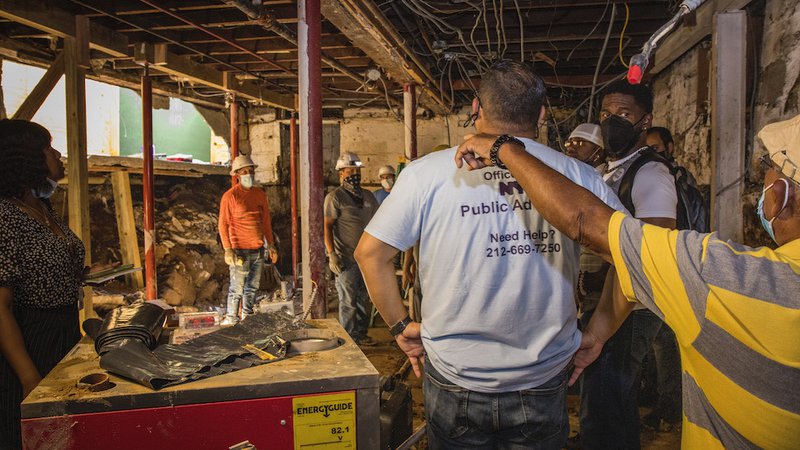In December 2022, winter storms caused extreme tidal flooding in low-lying neighborhoods, including in Southeast Queens and the Rockaways. This is not the first time these coastal areas were hit. This may have been the worst flooding since Superstorm Sandy. Unfortunately, with no support from FEMA in the city (FEMA support requires a federal declaration for a disaster), it has been hard for businesses and homeowners to find resources to recover. The Office of the Public Advocate sent out a statement demanding more legislation and investments on the city and state level as flooding becomes commonplace due to the growing climate catastrophe. While you can read our post about how to prepare for a storm, the following are some resources for those seeking relief right now:
Department of Financial Services (DFS)
DFS works with banks and lenders to eliminate excessive fees, prevent foreclosures, and encourage loan and mortgage forbearance for those affected by disasters. If you are unable to close on a loan or mortgage due to severe weather, they may also be able to help avoid adverse consequences, such as late fees for changes in the terms of closing. Find a Storm Recovery Resources Brochure (in multiple languages).
Have questions or a problem that you cannot resolve with your insurer or bank? Call the DFS Consumer Hotline at (800) 342-3736. Local calls can be made to (212) 480-6400 or (518) 474-6600, or learn how to file a complaint with DFS.
Homeowners & Renters Insurance/Flood Protection Insurance
Most homeowners and renters insurance does not come with flood protection by default, but if you have a good faith basis to believe that the policy covers your claim, you should always file a claim. For example, this might be the case if you believe that your losses were not principally caused by flooding (e.g. while flooding due to the weather might not be covered, if your water pipe burst, you might be covered). If the carrier denies the claim, it should provide a reason for the denial that is supported by the policy language.
If you have a flood insurance policy (either as a homeowner or renter), you should submit your loss to your insurance agent as soon as possible and document the damage. You'll need to provide proof of loss to your insurance company within 60 days of the flood. Find more details on the claims process.
Mental Health
Call or text the Disaster Distress Helpline at 1-800-985-5990 for support and counseling. The Disaster Distress Helpline is a national hotline that provides 24/7, year-round crisis counseling for people who are experiencing emotional distress related to any natural or human-caused disaster.
Contact your Bank and Other Creditors
Most banks and lenders have recovery procedures in place for customers impacted by disasters. Your creditors may be able to do even more for you if they know about your specific situation, such as payment assistance programs or temporary moratoriums on payment. Each lender is different, so contact all of them. Keep a detailed record of these conversations, and ask for confirmation in writing if your creditor agrees to a major change to your payment agreement.
- File a personal statement to your credit report. Explain that you were affected by a disaster and how it may have lowered your credit. This will let anyone who pulls your report know what happened. Learn More: Understanding your Credit Report and your Credit Score
Legal Assistance
The National Disaster Legal Aid Resource Center is an online resource that provides readily available legal information about disaster recovery regarding housing, insurance claims, employment, and other vital issues.
The Legal Aid Society may be able to help with housing related issues, including forbearance and homelessness. You can call their hotline at (718) 286-2450. You can also call the dedicated hotline for their Homeless Rights Project at (800) 649-9125 if you are experiencing homelessness.
The City Bar Justice Center (CBJC) provides legal advice over the telephone on civil legal issues, such as housing, to low-income New York City residents. They do not provide legal representation, but they do offer advice, information, and referrals. You can call a hotline specialist at (212) 626-7383, or apply for help from CBJC here.
One Shot Deal
You may be able to get help from the Human Resources Association if you cannot pay your bills because you lost your job, are getting less pay from your job, or had another emergency. This help is called “Emergency Assistance” or a “One Shot Deal.” Emergency Assistance can help in certain situations, including:
- “You lost clothes, personal items, or furniture because of theft, a fire, or a natural disaster.”
- “You have other issues that affect the health and safety of you or your family.”
- Find more information and One Shot Deal eligibility requirements.
Food Assistance and Housing Assistance
For general help, go to:
- Access HRA for food stamps, cash, and transportation assistance.
- City Harvest for food pantries, soup kitchens, and mobile markets.
- Hebrew Free Loan Society for storm damage-related loans.
- The Salvation Army in Greater New York for general assistance including shelter and immediate needs.
Lastly, in times of disaster, continue to check DisasterAssistance.gov to see if your area has been declared for FEMA support, which will give you more resources for disaster recovery.
Check out Part II of this two-part series, where we deep dive into how communities can organize to demand action, so that New York City is better prepared for any future disaster.
Relevant Links
Department of Financial Resources - Disaster and Recovery Page
Disaster Legal Service (Mainly for those in Federally Declared Zones)
IRS Disaster Assistance and Emergency Relief for Individuals and Businesses
Operation Hope - Financial Disaster Recovery
By Kashif Hussain, Deputy Public Advocate for Infrastructure & Environmental Justice, David Kahn, Infrastructure & Environmental Justice Community Organizer
